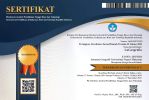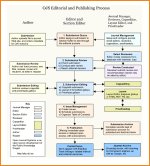Penerapan Model Problem Based Learning dalam Meningkatkan Kemampuan Berpikir Kritis Peserta Didik
(1) Universitas Negeri Makassar, Indonesia
(2) Universitas Negeri Makassar, Indonesia
(3) UPT SMA Negeri 1 Makassar, Indonesia
(4) UPT SMA Negeri 2 Gowa, Indonesia
(*) Corresponding Author
DOI: https://doi.org/10.35580/lageografia.v22i1.52195
Abstract
One of the skills that students need to have in 21st-century learning is critical thinking skills. In improving critical thinking skills, a learning model that can be used is needed, namely a problem-based learning model. For this reason, this research aims to reveal how the application of the problem-based learning model can improve students' critical thinking skills in class X at SMAN 2 Gowa. This research uses a type of classroom action research that is carried out in two learning cycles. The data collection technique used was observation with research instruments in the form of learning implementation plans, student worksheets, and observation guidelines. The research results show that the application of the problem-based learning model can improve students' critical thinking skills in class X at SMAN 2 Gowa. The implication of this research is that teachers in educational units are expected to be able to use the problem-based learning model considering it has been proven to improve student's critical thinking abilities. The application of the problem-based learning model in the future also needs to be applied at other levels, such as from elementary school to tertiary level.
Abstrak
Salah satu keterampilan yang perlu dimiliki peserta didik dalam pembelajaran abad-21 yakni keterampilan berpikir kritis. Dalam meningkatkan keterampilan berpikir kritis diperlukan model pembelajaran yang dapat digunakan yakni model problem based learning. Untuk itu, penelitian ini memiliki tujuan dalam mengungkap bagaimana penerapan model problem based learning dapat meningkatkan kemampuan berpikir kritis peserta didik kelas X di SMAN 2 Gowa. Penelitian ini menggunakan jenis penelitian tindakan kelas yang dilaksanakan sebanyak dua siklus pembelajaran. Teknik pengumpulan data yang digunakan yakni observasi dengan instrumen penelitian berupa rancangan pelaksanaan pembelajaran, lembar kerja peserta didik, dan pedoman observasi. Hasil penelitian menunjukkan bahwa penerapan model problem based learning dapat meningkatkan kemampuan berpikir kritis peserta didik kelas X di SMAN 2 Gowa. Implikasi penelitian ini yaitu guru di satuan pendidikan diharapkan dapat menggunakan model pembelajaran problem based learning dikarenakan terbukti dapat meningkatkan kemampuan berpikir kritis peserta didik. Penerapan model problem based learning kedepannya perlu juga diterapkan pada jenjang lain seperti mulai dari jenjang sekolah dasar hingga perguruan tinggi.
Keywords
Full Text:
PDFReferences
Ali, S. S. (2019). Problem Based Learning: A Student-Centered Approach. English Language Teaching, 12(5), 73–78. https://doi.org/10.5539/elt.v12n5p73
Argaw, A. S., Haile, B. B., Ayalew, B. T., & Kuma, S. G. (2017). The Effect of Problem Based Learning (PBL) Instruction on Students’ Motivation and Problem Solving Skills of Physics. EURASIA Journal of Mathematics Science and Technology Education, 13(3), 857–871. https://doi.org/10.12973/eurasia.2017.00647a
Arikunto, S., Suhardjono, & Supardi. (2015). Penelitian Tindakan Kelas. Bumi Aksara.
Begum, R., & Liton, H. A. (2020). Needs And Demands Of 21 St Century Learning Skills : A Reflective. International Journal Of English Language, Literature And Translation Studies (IJELR), 5(1), 222–232.
Bilgin, I. (2009). The Effects of Problem-Based Learning Instruction on University Students ’ Performance of Conceptual and Quantitative Problems in Gas Concepts. October 2016. https://doi.org/10.12973/ejmste/75267
Davidson, N., & Major, C. H. (2014). Boundary Crossings: Cooperative Learning, Collaborative Learning, and Problem-Based Learning. Journal on Excellence in College Teaching, 25(3&4), 7–55.
Deep, S., Salleh, B. M., & Othman, H. (2019). Study on Problem-Based Learning Towards Improving Soft Skills of Students In Effective Communication Class. International Journal Innovation and Learning, 25(1), 17–34. https://doi.org/10.1504/IJIL.2019.10016630
Dewi, D. T. (2020). Penerapan Problem Based Learning untuk Meningkatkan Kemampuan Berpikir Kritis Siswa. Jurnal Pendidikan Ekonomi Undiksha, 12(1), 1–14.
Faqiroh, B. Z. (2020). Problem-Based Learning Model for Junior High School in Indonesia (2010-2019). Indonesian Journal of Curriculum and Educational Technology Studies, 8(1), 42–48.
Halpern, D. F., & Dunn, D. S. (2021). Critical Thinking: A Model of Intelligence for Solving Real-World Problems. Journal of Intelligence, 9(22), 1–7. https://doi.org/doi.org/ 10.3390/jintelligence9020022
Heard, J., Scoular, C., Duckworth, D., Ramalingam, D., & Teo, I. (2020). Critical thinking: Definition and Structure. Australian Council for Educational Research.
Hirschman, K., & Wood, B. E. (2018). 21 st Century Learners: Changing Conceptions of Knowledge, Learning and the Child. New Zealand Annual Review of Education, 23, 20–35. https://doi.org/10.26686/nzaroe.v23i0.5280
Kereluik, K., Mishra, P., Fahnoe, C., & Terry, L. (2013). What Knowledge Is of Most Worth: Teacher Knowledge for 21. Journal of Digital Learning in Teacher Education, 29(4), 127–140.
Kong, L., Qin, B., Zhou, Y., Mou, S., & Gao, H. (2014). The Effectiveness of Problem-Based Learning on Development of Nursing Students’ Critical Thinking: A Systematic Review and Meta-Analysis. International Journal of Nursing Studies, 51, 458–469. https://doi.org/10.1016/j.ijnurstu.2013.06.009
Kopzhassarova, U., Akbayeva, G., Eskazinova, Z., Belgibayeva, G., & Tazhikeyeva, A. (2016). Enhancement of Students’ Independent Learning Through Their Critical Thinking Skills Development. International Journal Of Environmental & Science Education, 11(18), 11585–11592.
Lapuz, A. M. E., & Fulgencio, M. N. (2020). Improving the Critical Thinking Skills of Secondary School Students using Problem-Based Learning. International Journal of Academic Multidisciplinary Research (IJAMR), 4(1), 1–7.
Liu, Y., & Pasztor, A. (2022). Effects of Problem-Based Learning Instructional Intervention on Critical Thinking in Higher Education: A Meta-Analysis. Thingking Skill and Creativity, 45, 1–21. https://doi.org/10.1016/j.tsc.2022.101069
Lusiana, N., Herwin, & Fatmawati, L. (2022). PBL and PJBL Comparative Study on Critical Thinking Ability in Blended Learning. International Journal of Elementary Education, 6(3), 682–690. https://doi.org/https://doi.org/10.23887/ijee.v6i4.48458
Maulidiya, M., & Nurlaelah, E. (2019). The Effect of Problem Based Learning on Critical Thinking Ability in Mathematics Education. International Conference on Mathematics and Science Education (ICMScE 2018), 1157, 1–4. https://doi.org/10.1088/1742-6596/1157/4/042063
Monalisa, C., Ahda, Y., & Fitria, Y. (2019). Critical Thinking Skill Improvement Using Problem Based Learning (PBL) Model of 4 th Grade Students of Elementary School. International Journal of Science and Research (IJSR), 8(2), 429–432.
Nadeak, B., & Naibaho, L. (2020). The Effectiveness Of Problem-based Learning On Students’ Critical Thinking. Jurnal Dinamika Pendidikan, 13(1), 1–7. https://doi.org/10.33541/jdp.v13i1
Nor, H. M., & Sihes, A. J. (2021). Critical Thinking Skills in Education: A Systematic Literature Review. International Journal Of Academic Research In Bussiness & Social Science, 11(11), 198–201. https://doi.org/10.6007/IJARBSS/v11-i11/11529
Rani, F. N., Napitupulu, E., & Hasratuddin. (2018). Analisis Kemampuan Berpikir Kritis Matematis Siswa Melalui Pendekatan Realistic Mathematics Education Di SMP Negeri 3 Stabat. Paradikma Jurnal Pendidikan Matematika, 11(1), 1–7.
Renatovna, A. G., & Renatovna, A. S. (2020). Developing Critical Thinking On Elementary Class Pupils Is The Most Important Factor For Preparing Social Relationship. Journal of Critical Reviews, 7(17), 438–448.
Sadeghi, F., Adel, S. M. R., Zareian, G., & Davoudi, M. (2020). Language EFL Teachers’ and Learners’ Perceptions of the Principles of Critical Thinking: A Constructivist Grounded Theory Study. Iranian Journal of Language Teaching Research Urmia, 8(2), 63–81. https://doi.org/https://doi.org/10.30466/ijltr.2020.120889
Supena, I., Darmuki, A., & Hariyadi, A. (2021). The Influence of 4C (Constructive, Critical, Creativity, Collaborative) Learning Model on Students’ Learning Outcomes. International Journal of Instruction, 14(3), 873–892. https://doi.org/https://doi.org/10.29333/iji.2021.14351a
Ural, E., & Dadli, G. (2020). The Effect of Problem-based Learning on 7th-grade Students’ Environmental Knowledge, Attitudes, and Reflective Thinking Skills in Environmental Education. Journal of Education in Science, Environment and Health (JESEH), 6(3), 177–192. https://doi.org/10.21891/jeseh.705145
Valdez, J. E., & Bungihan, M. E. (2019). Problem-Based Learning Approach Enhances The Problem Solving Skills In Chemistry Of High School Students. Journal of Technology and Science Education, 9(3), 282–294. https://doi.org/https://doi.org/10.3926/jotse.631
Zakaria, M. I., Maat, S. M., & Khalid, F. (2019). A Systematic Review of Problem Based Learning in Education. Creative Education, 10, 2671–2688. https://doi.org/10.4236/ce.2019.1012194
Zivkovic, S. (2016). A Model of Critical Thinking as an Important Attribute for Success in the 21st Century. Procedia - Social and Behavioral Sciences, 232, 102–108. https://doi.org/10.1016/j.sbspro.2016.10.034
Article Metrics
Abstract view : 239 times | PDF view : 38 timesRefbacks
- There are currently no refbacks.
Copyright (c) 2023 Reza Gunawan, Muhammad Hasan, Kasmawati, Jospiar AS

This work is licensed under a Creative Commons Attribution-NonCommercial 4.0 International License.
LaGeografia: Jurnal Program Studi Pendidikan Geografi, Jurusan Geografi, Fakultas MIPA, Universitas Negeri Makassar.
Email: [email protected] | +6285298749260
Editorial Office














































